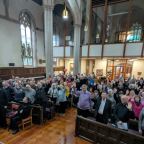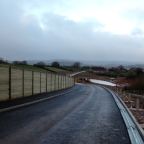
Interview: Tony Hogg, Police and Crime Commissioner marks six months in the role
Devon and Cornwall's Police and Crime Commissioner (PCC), Tony Hogg has given an interview to mark his first six months in the role.
In the interview for his website, he discusses his experience of the first six months, the role itself, his priorities, turning his plan into reality and how the PCC is evolving.
You can find a transcript of the interview below and watch the embedded video interview.
Tony Hogg interview
How do you assess your first 6 months, in terms of achievements, and also setting out your priorities and working structure for your time in office?
When I came into the job, in those first few weeks and months, there was really little choice as to what we did. Those first few weeks and months seemed challenging, but looking back on them now, they seem less challenging and actually the future seems more challenging.
That time was spent setting up governance mechanisms, and I mean by that, how we make decisions that are transparent and fair, and the public can observe.
Obviously I had to meet my team and understand how I would work with them. We didn’t have much time at that stage to restructure ourselves for the future. I don’t think we really understood the future at that stage, but got straight into appointing a Chief Constable, very quickly, starting to work up a police and crime plan and of course the budget at the same time. Really the latter part of last year, and early part of this year, focussed on concluding that in time for the start of the financial year, and of course having all of those issues approved by the Police and Crime Panel (my 20 strong scrutiny body).
We did the appointing business and, Shaun Sawyer very ably came out at the top of that. He has a very strong vision about his intentions for the Force, bearing in mind he had been the temporary Chief Constable for a little while before that. The budget and plan came together and after a better than expected settlement and putting the precept up by 2% we had a good news budget and plan in terms of stopping the decline in police numbers. Recruiting began for the first time in two years, police officers, recruiting special constables, an extra 200 over the following four years, and investing in training and IT and mobile data and things like that.
What have people being saying to you, not only about priorities, but the role itself and how much they are now coming on board with what your role is all about?
I think the most striking thing is that people, as I talk to them in many groups, are better understanding of the role of the Police and Crime Commissioner. As I explain that and I explain the nature of policing, both the quality of policing but also the challenges that the police face in this, the largest policing area in England, people are amazed and want to know more about it.
So, another interesting area is a complete misunderstanding of the difference between the Police and Crime Commissioner and the Chief Constable and indeed the Police and Crime Panel. People either think that I am in charge of the police force operationally, or they think I am the Chief Constable, and being able to explain those issues to them, is really important. The difference being that I represent the governing body for policing. The Chief Constable is very much in charge of operational policing and operational decisions. He and I get on very well and we understand there is a grey area between those two activities.
So far so good in challenging times, and in that first chapter, I spent a considerable amount of time with the police, including a full night out in Plymouth seeing the night economy, and the damage that excessive alcohol can cause. I have also met police officers right across the policing area, including the Isles Of Scilly, but also the public at many events, too many to mention here. I have been engaging with the public, charities, organisations and of course Community Safety Partnerships, Drug And Alcohol Action Teams and Youth Offending Teams.
Give us an example of the sort of frequently asked questions that people come up with. I know they talk about your role alongside the Chief Constable, but people are also talking, I believe, about how you can, now you have set out your policing plan, actually make that become a reality.
Well, yes they ask quite brutally why do we need you, what difference are you going to make? Now I think with the benefit of 6 months in the role, I can see very clearly that there are a number of areas where we are going to make a significant difference and we are going to do things better than the old Police Authority.
I think primarily we are engaging with the public in a new way. We are going to give people a better say in their policing priorities. We are going to make it possible for them to have a better feel about policing. Now some may want to engage with that, some may not, but at least I will be providing the avenue for engagement so that the public can comment on the priorities in policing and those priorities are developed though the Community Safety Partnerships and the Community Safety Partnerships Chairs group. That Chairs Group provides a peninsular strategic assessment which informs my plan on crime priorities. So the democratic mechanism is there and people can engage in that, comment on it, and be consulted on it as well.
Finally, 6 months into the job, how does it differ, how has it changed, and how is it evolving? You are already a 7th of the way through your term in office. Is it the job that you thought it was?
I don’t think I have made any rash decisions yet, I am taking it steadily, I have a sense of being a pioneer setting it up for the longer term, I am perfectly happy to tough out the need to resource the team properly because we are taking on more and more than the police authority.
We are going to do commissioning which the Police Authority didn’t do. We are looking after victim services, which the Police Authority didn’t do. We are going to measure performance better. We are going to engage with the public better. I inherited a team of around 15 and we are engaging another 6 more people. That is a relatively small group in comparison to the police, I think 0.3 % of policing or something like that, and we aim to cost less than the old Police Authority. We want to do the job better and I have to persuade my police and crime panel, and the public, why we need these numbers and why it is important.
The public need to trust me and I have no reason to do anything that is particularly outlandish. All of the issues should be supported by business cases and good argument, but, in this period that we are in now, we are reorganising the office. We are setting up the performance mechanisms that I have talked about. I am engaging with Health and Wellbeing Boards, local Criminal Justice Boards and Community Safety Partnerships.
I am putting forward an alcohol seminar because I want to get on top of people’s thinking around alcohol and the night time economy.
I want to do an awful lot on demand reduction on our police. We have less police officers and we are going to have another funding round coming up in a couple of years time, and we need to be ready for that. So we need to look at partnership working, we need to look at the public playing its part, we need to look at collaboration, we need to look at new ways of safeguarding and we need to look at the policing model and commissioning. In all of that, together with specific things like alcohol and its misuse, we need to try and reduce the demand on policing because we need to face the future in a sustainable way.
So we are going to have the safest and the best police force going forward, we are going to look after vulnerable people, we are going to see falling crime and we are going to see a flourishing economy.














